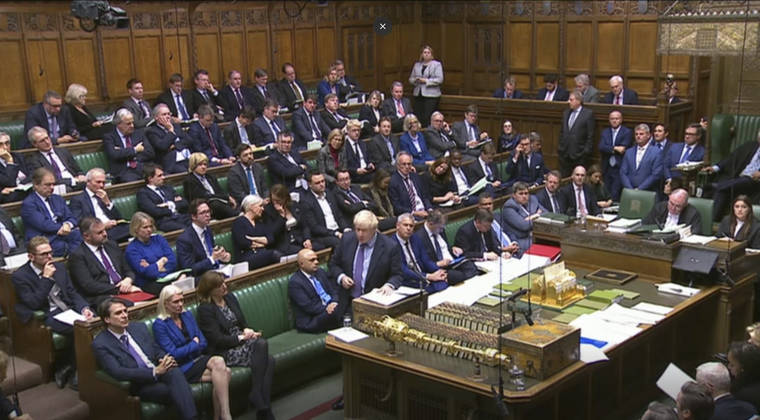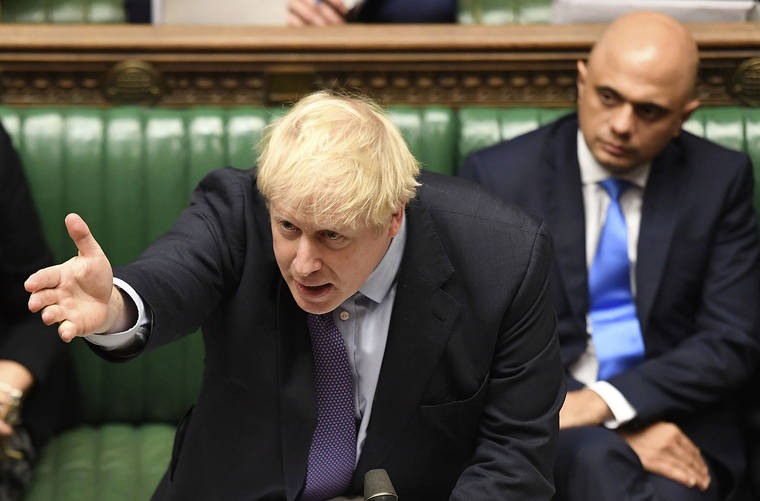LONDON — British Prime Minister Boris Johnson was headed for a showdown Tuesday with lawmakers who want to put the brakes on his drive to push his European Union divorce bill through the House of Commons in just three days and take Britain out of the bloc by Oct. 31.
Johnson said that if Parliament imposes a longer timetable, he will withdraw the bill and call a vote on holding a snap general election — a threat aimed at breaking the political deadlock over Brexit that has dragged on for more than three years since British voters opted to leave the EU.
“I will in no way allow months more of this,” said Johnson, who took power in July vowing that the U.K. would leave the bloc on the scheduled date of Oct. 31, come what may.
“If Parliament refuses to allow Brexit to happen and instead … decides to delay everything until January or possibly longer, in no circumstances can the government continue with this (bill),” he said.
Last week Johnson struck a divorce deal with the 27 other EU leaders, but on Saturday he failed to win Parliament’s backing for it. His only remaining hope of leaving on time is to get lawmakers to pass the Brexit-implementing bill into law before the scheduled departure date, nine days away.
Johnson’s threat to pull the bill, which would turn the exit deal into law, piles pressure on lawmakers as they consider whether to approve the government’s legislation. The bill faces two votes Tuesday: The first will ask lawmakers to approve it in principle, followed by a vote on the government’s schedule for debate and possible amendments.
Johnson said backing the bill would allow lawmakers to “turn the page and allow this Parliament and this country to begin to heal and unite.”
The Brexit deal sets out the terms of Britain’s departure, including measures to maintain an open border between the U.K.’s Northern Ireland and EU member Ireland. It also enshrines the right of U.K. and EU citizens living in the other’s territory to continue with their lives, and sets out the multibillion pound (dollar) payments Britain must make to meet its financial obligations to the EU.
But the deal does not cover the nitty gritty of future relations between the U.K. and the EU: Instead, it confirms a transition period lasting until at least the end of 2020 — and possibly 2022 — in which relations will remain frozen as they are now while a permanent new relationship is worked out.
If the bill doesn’t pass and Britain leaves the EU without a deal, there will be no transition period, uncertainty for millions of citizens and a host of new tariffs, customs checks and other barriers to trade on Day 1. Most economists say that would send unemployment rising, the value of the pound plummeting and plunge the U.K. into recession.
Johnson’s Conservatives hold just 288 of the 650 House of Commons seats, so he will need support from opposition and independent lawmakers to pass the bill, though many analysts expect it be approved.
The sticking point is expected to be the three-day timetable because of concerns it doesn’t provide enough time for scrutiny of the 115-page document. Major bills usually take weeks or months to pass through Parliament, giving time for line-by-line scrutiny by lawmakers.
Green lawmaker Caroline Lucas tweeted that lawmakers “had more time to debate the Wild Animals in Circuses Act (affecting 19 animals) than they will to decide the future of 65 million people. It’s hard to think of anything which better illustrates this Govt’s contempt for people, Parliament & democracy.”
Ominously for the government, some lawmakers who support the Brexit deal said they would vote against the short timetable.
“Unless you are prepared to contemplate more expansive debate, there is not the slightest possibility of considering the deal that has been obtained within the time available,” Ken Clarke, a senior lawmaker recently ousted from Johnson’s Conservative Party group in Parliament, told the Guardian newspaper.
Johnson’s government had sought a “straight up-and-down vote” Monday on the agreement.
But the speaker of the House of Commons, John Bercow, refused to allow it because lawmakers voted to delay approving the Brexit deal on Saturday, and parliamentary rules bar the same measure from being considered a second time during a session of Parliament unless something has changed.
Bercow’s ruling plunged the tortuous Brexit process back into grimly familiar territory: acrimonious uncertainty.
If Parliament agrees to Johnson’s timetable, opposition lawmakers plan to seek amendments that could substantially alter the bill, for example by adding a requirement that the Brexit deal be put to voters in a new referendum, or by requiring the government to extend the transition period until a new trade deal with the EU has been agreed.
The government says such major amendments would wreck its legislation, and it will withdraw the bill if the opposition plan succeeds.
With the Brexit deadline looming and British politicians still squabbling over the country’s departure terms, Johnson has been forced to ask the EU for a three-month delay to Britain’s departure date.
He did that, grudgingly, to comply with a law passed by Parliament ordering the government to postpone Brexit rather than risk the economic damage that could come from a no-deal exit.
European Council President Donald Tusk said Tuesday that EU leaders “will decide in coming days” whether to grant Britain that extension — what would be the third.
———
Associated Press writer Lorne Cook in Brussels contributed to this report.
———
Follow AP’s full coverage of Brexit and British politics at https://www.apnews.com/Brexit



